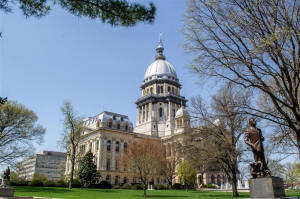Lawmakers returning to Springfield to consider congressional remap, more
 Send a link to a friend
Send a link to a friend
[October 19, 2021]
By JERRY NOWICKI
Capitol News Illinois
jnowicki@capitolnewsillinois.com
 SPRINGFIELD – Illinois’ first congressional
remap draft is out but changes could be in store as lawmakers return to
Springfield Tuesday for the first of their final two weeks of scheduled
session in 2022. SPRINGFIELD – Illinois’ first congressional
remap draft is out but changes could be in store as lawmakers return to
Springfield Tuesday for the first of their final two weeks of scheduled
session in 2022.
It’s customary for lawmakers to meet each fall to consider overriding or
accepting any of the governor’s vetoes or amendatory vetoes of
legislation passed in the regular session. The two-week period is
generally referred to as the fall “veto session.”
But this year, lawmakers took their override votes when they were in
town to consider a recently-passed energy regulatory overhaul bill,
leaving no more veto business to be considered over the next two weeks.
Instead, the congressional maps will be the main topic of discussion
during the fall session, while lawmakers are also considering repealing
a Parental Notice of Abortion law and making changes to the state’s
Health Care Right of Conscience Act to strengthen the governor’s ability
to mandate COVID-19 vaccinations or testing requirements, among other
potential actions.
Congressional remap

Lawmakers unveiled draft congressional maps on Friday. But if they
follow a similar process to the one taken to approve state legislative
district maps earlier this year, there will likely be changes to the
boundaries ahead of their final passage.
The remap effort will have national implications, as it will create the
congressional boundaries for the next 10 years, including for the first
mid-term election under President Joe Biden next year.
The U.S. House is split 220-212 in favor of Democrats with three seats
currently vacant – two last held by Democrats and one last held by a
Republican. With Democrats firmly in control of the remap process in
Illinois, national observers have noted the state would be pivotal to
Democrats maintaining the balance of power in the House.
Illinois will have 17 congressional districts to draw this year, down
from the 18 it had for the past 10 years, due to a population decline
since the 2010 U.S Census. Currently, the state has 13 Democratic
congressional representatives and five Republicans, but observers have
noted the Democrats have several pathways to drawing a map to give the
party a 14-3 advantage in the state.
There are hearings scheduled for this week to discuss the maps and
potential judicial subcircuit changes in certain areas of the state,
although public input has thus far been lacking.
Parental Notice of Abortion
Currently, Illinois has a law on the books stating “no person shall
knowingly perform an abortion” on a person under the age of 18 unless
the physician’s office “has given at least 48 hours actual notice to an
adult family member of the pregnant minor.”
The notice requirement doesn’t apply if a minor is accompanied by an
adult family member or if an adult family member waives the notice in
writing. Additionally, there are exceptions for minors who are victims
of physical or sexual abuse or neglect by an adult family member.
Per the law, no notice is required in cases where the minor is married,
divorced or widowed, if the minor has been legally emancipated, or if
the health care provider determines that there is a medical emergency.
The law also allows for “judicial bypass,” meaning the courts can waive
the requirement in certain circumstances.
The law does not require parental consent.
House Speaker Emanuel “Chris” Welch was the cosponsor of a bill to
repeal the parental notification requirement earlier this year,
contained in House Bill 1797. That measure stalled in committee, but
advocates have restarted the push in recent weeks to repeal the notice
law, according to the Associated Press.
[to top of second column]
|

The Illinois State Capitol is pictured in
Springfield. (Capitol News Illinois file photo)

At an event in Springfield last week, Gov. JB
Pritzker said he was in favor of repealing the parental notice law,
although he was unsure if it would come for a vote in the veto
session.
Health Care Right of Conscience
Pritzker has mandated vaccine or testing requirements for state
workers in congregate settings, for health care providers and for
school employees – although negotiations with one of the major
unions representing many of those workers are still ongoing.
Now, the governor is seeking a change to an existing state law that
some are using to defy the mandates and testing requirements based
on religious beliefs.
The Health Care Right of Conscience Act defines conscience as “a
sincerely held set of moral convictions arising from belief in and
relation to God, or which, though not so derived, arises from a
place in the life of its possessor parallel to that filled by God
among adherents to religious faiths.” On those lines, certain care
can be refused.
The governor’s office has been promoting legislation that would
narrow the allowable exemptions when it comes to COVID-19
requirements, although a spokesperson did not identify the exact
language it was pursuing.
“The Health Care Right of Conscience Act was never intended to allow
people to avoid public health guidance and jeopardize workplace
safety during a global pandemic. The administration supports efforts
to clarify the law, so it cannot be misinterpreted by fringe
elements,” Pritzker spokesperson Emily Bittner said in a statement
Monday.
Electric vehicles
The Crain’s Chicago Business newspaper also reported that Pritzker’s
office has been pushing for an incentives package aimed at promoting
the electric vehicle industry in Illinois. The newspaper reported
the package could include a refundable state income tax credit of
75-100 percent of withholding from workers at electricity
manufacturing and supply plants for up to 15 years.
Other tax exemptions and job training assistance programs could also
be included in the package, which is aimed at keeping existing
manufacturers in the state and luring new ones here, according to
Crain’s.

Unemployment
The state’s Unemployment Insurance Trust Fund has a deficit of $4.4
billion, according to the U.S. Treasury. This week, lawmakers are
not expected to pass a long-term solution to pay down the debt –
those talks are likely to come in the regular budgeting process next
year.
But a major insurance premium hike for businesses and benefit cuts
for people claiming unemployment is scheduled to take effect in
January without legislative action, so negotiators on the
unemployment front said the tentative plan is to push off the
effective date of those rate changes to give lawmakers more time to
consider a long-term fix.
Capitol News Illinois is a nonprofit, nonpartisan
news service covering state government and distributed to more than
400 newspapers statewide. It is funded primarily by the Illinois
Press Foundation and the Robert R. McCormick Foundation. |